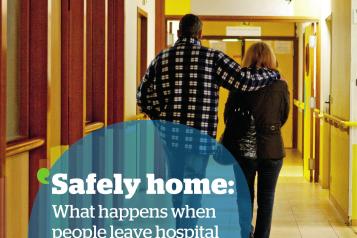Getting hospital discharge right would stop suffering and save millions of pounds

Focusing on those most affected by poorly managed discharge processes - those with mental health conditions, older people and homeless people - our report reveals five ways patients and care users say they are currently being let down by the system.
- People are experiencing unsafe, delayed or untimely discharge due to a lack of co-ordination between health, social care and community services.
- There is a lack of support available for people after discharge, often leading to readmission.
- Many people feel discriminated against or stigmatised during their care, often feeling 'rushed out the door'.
- People do not feel involved in decisions about their ongoing care post discharge.
- Individuals' full range of needs are not considered when being discharged from hospital or a mental health setting - including their housing situation, carer responsibilities etc.
In 2014 the National Audit Office reported that in the space of a year the NHS deals with one million emergency readmissions within 30 days of discharge, costing an estimated £2.4 billion. Whilst not all of these cases are the result of a poorly managed discharge, our patient-led investigation found that 17 per cent of those being readmitted for the same issue in the past three years are returning to hospital within just seven days, suggesting a significant problem with the current process.
This is by no means a new problem, but our report highlights the human consequence of unsafe discharge and outlines the potential to save millions of pounds by getting discharge right first time. The report describes some excellent examples of discharge being managed well, proving that the challenges of working across service boundaries can be resolved. But there is considerable variation up and down the country and a need for the good practice to be spread.
Our call to everyone in health and social care is to not just hear what these 3,000 plus voices have to say, but to take action and devise a collective plan to tackle this issue and track progress. A first step was taken late last week when together with the Department of Health, we brought together all those organisations with an interest in getting this right in the future. We will be working with local Healthwatch to ensure the discharge process is put at the top of agenda locally as services work towards greater integration.

